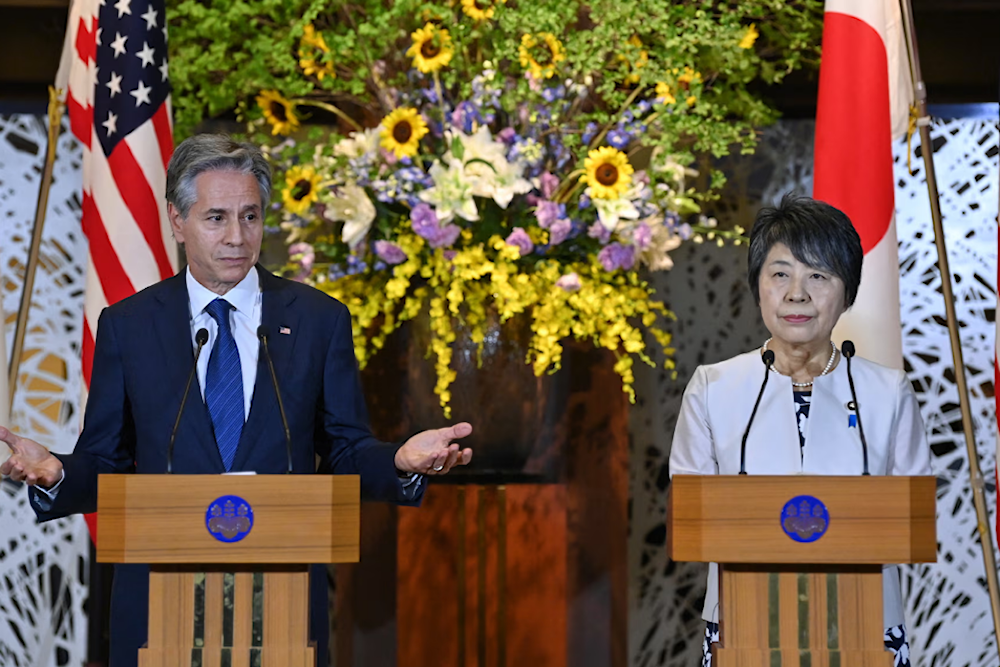Japan and US boost military ties citing China threat
Discussions between the US and Japan take place ahead of the Quad meeting with foreign ministers from Australia, Japan, the US, and India.
-

US Secretary of State Antony Blinken (L) gestures as he attends a joint press conference with Japan's Foreign Minister Yoko Kamikawa (R), following talks at the Iikura Guest House in Tokyo. (AFP via Getty Images)
Japanese and US defense and diplomatic officials agreed to enhance military cooperation by upgrading the command and control of US forces in Japan and boosting American-licensed missile production. They cited what they perceive as a growing threat from China as "the greatest strategic challenge."
US Secretary of State Antony Blinken and Defense Secretary Lloyd Austin, along with Japanese counterparts Yoko Kamikawa and Minoru Kihara, met at the Japan-US Security Consultative Committee (known as "2+2" security talks) in Tokyo, reaffirming their alliance amid President Joe Biden’s withdrawal from the November presidential race.
The discussions occurred ahead of the Quad meeting with foreign ministers from Australia, Japan, the US, and India.
Currently, over 50,000 US troops are stationed in Japan. The US Forces Japan (USFJ) commander based in Yokota, Tokyo's western suburbs, lacks direct authority and operates under the United States Indo-Pacific Command (INDOPACOM) in Hawaii. The new plans will reportedly enhance USFJ capabilities while maintaining its reporting structure to INDOPACOM.
The command upgrade “will be the most significant change to the US Forces Japan since its creation, and one of the strongest improvements in our military ties with Japan in 70 years,” Austin said. “These new operational capabilities and responsibilities will advance our collective deterrence.”
“We are standing at a historic turning point as the rules-based, free and open international order is shaken to the core,” Kamikawa said. “Now is a critical phase when our decision today determines our future.”
US further meddles in East Asia
In his opening remarks, Austin claimed that China is “engaging in coercive behavior, trying to change the status quo in the East and South China Seas, around Taiwan, and throughout the region.”
He also alleged that the DPRK’s nuclear program and its increasing collaboration with Russia “threaten regional and global security.”
In a joint statement released after the talks, the ministers claimed that China's foreign policy aims to reshape the international order for its own advantage at the expense of others. They added, "such behavior is a serious concern to the alliance and the entire international community and represents the greatest strategic challenge in the Indo-Pacific region and beyond.”
The ministers stated that the planned changes to US command, scheduled for March to align with Japan's own command updates, are intended “to facilitate deeper interoperability and cooperation on joint bilateral operations in peacetime and during contingencies” and to improve intelligence coordination, surveillance, reconnaissance, and cybersecurity.
US committed to 'extended deterrence'
The new US command in Japan will be headed by a three-star general, rather than the four-star position Japan had sought. However, Austin mentioned that "we haven’t ruled that out" and will continue to negotiate.
In a joint statement, the ministers reiterated the US commitment to "extended deterrence," which encompasses nuclear weapons, in response to what the US perceives as nuclear threats from Russia and China.
Japan has been rapidly expanding its military capabilities and increasing joint operations with the US and South Korea while working to strengthen its predominantly domestic defense industry.
Following an April agreement between Japanese Prime Minister Fumio Kishida and President Biden, Japan and the US have also intensified cooperation in the arms industry. They have established working groups for co-producing missiles and for maintaining and repairing US Navy ships and Air Force aircraft in the region.
On Monday in Tokyo, Blinken was scheduled to meet with counterparts from the Quad—a group viewed with suspicion by China—for discussions expected to focus on maritime security and initiatives to enhance cyber defenses.
It is worth noting that China views the increased US cooperation with Japan as a significant threat. The growing military collaboration, including joint operations and arms industry cooperation, reinforces China's apprehensions about a stronger, more integrated US-Japan alliance that could aid the US in its regional ambitions.
China has urged Japan to contribute constructively to maintaining and promoting peace, stability, and development, rather than acting as a "vanguard" for Western expansion into the Asia-Pacific region. Observers have noted that such rhetoric criticizing China reveals Japan's true intention to vilify the Taiwan issue and stir up regional tensions.
Read more: China seeks stable, productive relations with Japan: Premier Li Qiang

 4 Min Read
4 Min Read









